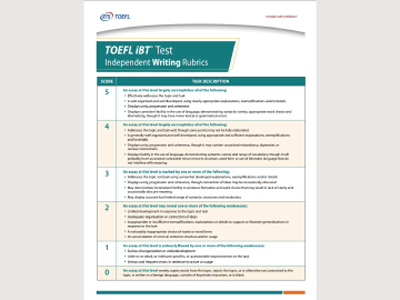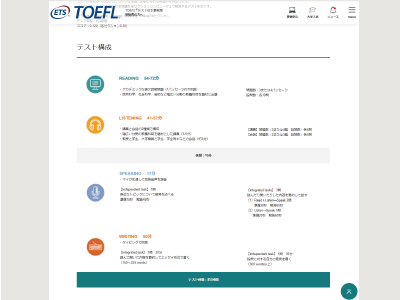
2016.09.27
 【対象レベル:中級】
【対象レベル:中級】
第43回 レベル別・TOEFL iBT® テスト 4技能対策⑧
「中級Writing・Independent Task対策」
皆さんこんにちは。9月も終わりに近づき暑さもだいぶ和らぎましたね。とはいえまだ台風なども来るようですし、10月になれば色々とイベントも増えると思います。是非とも計画的に勉強時間とTOEFL iBT® テスト本試験の受験日程を確保するようにしましょう。
さて今回はWritingについて勉強しましょう。前回(第38回 レベル別・TOEFL iBT® テスト 4技能対策④「初級Writing・Independent Task必須表現」)は、主にセンテンスレベルでの役に立つ表現を学習しました。今回は中級レベルを意識して、実際にどのようなエッセイを目指すべきなのかを明らかにしていきましょう。
中級レベルのスコアを目指すには、まず確実にIndependent Taskにおいて3~4点を取ることが望ましいです。
理由としては、
- - Integrated TaskではReadingとListeningの作業が加わるので、純粋にWritingのスキルだけではない。
- - Independent Taskは普段からある程度準備がしやすい。また書き直しや添削などがやりやすい。
ということで今回もまずはIndependent Taskに焦点を当てていきましょう。
採点基準
TOEFL iBTテストでは採点基準が一般公開されています(参照:Independent WRITING Rubrics)ので、採点者がエッセイのどのような点を重要視するのかをまず知っておくと無駄なことをせずにスコアアップに近づけます。中級で目標とする4点の基準の中で、まずは
重要なポイントを見てみましょう。
- ・全体の構成と展開が良い
- ・適切で充分な説明、例示、詳細がある
- ・アイディアのつながりがわかりやすい
またマイナス点(減点の対象となりうる)は以下の通りです。
- ・部分的に説明不足な点がある
- ・不要な部分、話が逸れる、アイディアがつながらない、などが見られる
- ・内容に影響のない程度の文法・表現的なミスが見られる
構成に関する注意点
では実際にどのようにエッセイを構成すれば良いのでしょう?以前本連載で構成に関する注意点について述べておきましたので、第11回 TOEFL iBT® テスト Writing対策 No.3 Independent Task 注意点を是非読んでください。
またもう1つ注意点として、「長いイントロと結論を書かない」という点が挙げられます。これはTOEFL iBTテスト公式ガイド(The Official Guide to the TOEFL® Test 4th Edition)に書かれています。
“Do not "memorize" long introductory and concluding paragraphs just to add words to your essay. Raters will not look favorably on wordy introductory and concluding paragraphs…”
(エッセイの語数を増やすためだけに、長いイントロと結論のパラグラフを記憶しないこと。採点者は冗長なイントロと結論を好意的には受け止めない)
(The Official Guide to the TOEFL® Test 4th Edition, p.207)
「とりあえずなんとか量を増やせば高得点につながる」という誤った考えに捉われないように気をつけましょう。
サンプルトピックとサンプルエッセイの分析
それでは実際にサンプルを見てみましょう。トピックはこちらです。
Question: Do you agree or disagree with the following statement?
A teacher’s ability to relate well with students is more important than excellent knowledge of the subject being taught.
Use specific reasons and examples to support your answer.
ここで問われているのは、「教える科目の優れた知識よりも、生徒と良い関係性を持てるほうが教員にとっては重要だ」ということですね。皆さんだったらどのように解答しますか?
ではサンプルエッセイを見てみましょう。これは4点のサンプルです。
I disagree with the idea that the possessing the ability to relate well with student is more important than excellent knowledge of the subject being taught for a teacher. There are several reasons why I disagree with that idea.
First, teachers’ job is to educate their student with their knowledge. The ability to relate well with their student is something a counselor should possess, not a teacher. That’s why the board of education gives an award to a teacher with an excellent knowledge of the subject they teach. Teachers who can get along with their students but have no knowledge can be popular and be liked by his or her students, however I don’t consider a teacher with no knowledge a good teacher.
Second, Students go to schools because they want to learn knowledge from their teachers not to get along with their teachers. I knew a math teacher who was well known among other mathematics teachers. Some students always complained how he never entertains his students which made many of his students to fall asleep. Nevertheless, all of his classes were all full even before the semester began because many students who were eager to learn already booked in. He won the Apples prize (it’s given to a noticed teacher annually) a couple of times and that enabled students to firmly believe in his way of teaching.
Thirdly, teachers are responsible for conceding their knowledge to their next generation. Teachers already had an experience of getting advantaged education from college. Teachers should not let that previlege become useless and workless. We all learn because we want to become the better person that this world needs. Students will also eventually grow up to be influencing other people and teachers should volunteerily be their students’ role models.
For conclusion, I think the most important quality a teacher must have is an excellent knowledge of the subject they teach, not an ability to relate well with their students. (326 words)
(TOEFL® Test Prep Planner, p.73)
これを読んで皆さんはどう思いましたか?ではこれに対する考察をまとめてみましょう。
良い点:
- ・イントロで自分の意見が明確に示してある
- ・ボディパラグラフで3つの理由・論点が示してある
- ・第一ボディで、教員の役割とカウンセラーの役割の対比が書かれている
- ・第二ボディで、実例を交えながら生徒は知識を得るために学校に行くのであり、楽しむためではないと論じている
悪い点:
- ・第三ボディのアイディアは面白いものの、意味が不明瞭な表現がいくつかある。
- 例:“conceding”(譲歩する、敗北を認める)の使い方
- “advantaged education”(advancedなのかadvantagesなのか)
- ・アイディアの流れが散漫としていてわかりづらい
全体的に:
- ・所々に文法やスペルミスが見られるが、内容理解に大きな支障はない
- ・構成や展開は良いもののアイディアが繋がりにくく、わかりづらい部分があるので4点止まりとなる
このように多少のミスがあっても、主張したい論点に対するサポートをボディでしっかりと展開できていれば4点は可能です。また市販の教材でよく指導している “For example,…”という形式にしなくても、きっちりと例示が含まれているのもポイントです。形ではなく内容の充実さで勝負するということをお忘れなく!
それでは今回はここまでにしましょう。次回(第44回 レベル別・TOEFL iBT®テスト 4技能対策⑨「上級Reading・高難易度の問題対策」)は上級Reading対策です。お楽しみに!

- 五十峰聖先生
- ETS Authorized Propell® Facilitator
ETS TOEFL ITP® Teacher Development Workshop Facilitator
- 桜美林大学 芸術文化群 特任講師
- プロフィールはこちら








